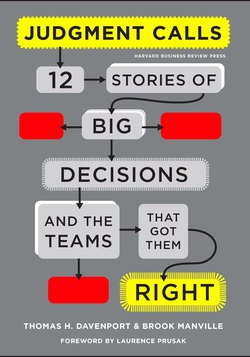Читать книгу Judgment Calls - Thomas H. Davenport - Страница 15
На сайте Литреса книга снята с продажи.
Оглавление1
NASA STS-119
Should We Launch?
IN FEBRUARY 2009, the engineers and scientists of NASA were wrestling with a grave, potentially life-or-death decision: whether to green-light the launch of mission STS-119, the next flight of the space shuttle Discovery. Every launch of a NASA manned spacecraft puts astronaut lives and millions of dollars of equipment on the line; reputation, political capital, and scientific standing also ride on a successful launch, but catastrophe can undo them all. For every mission, NASA would like the maximum possible certainty, but there are project pressures against endless debate and analysis to unravel every possible concern. Operational schedules are tightly wound and project milestones are critical. The issue here was whether STS-119 might have a faulty valve in the systems supplying fuel to the engines, integral to maintaining pressure in the all-important hydrogen tank. The previous mission (STS-126) had experienced such a problem, which had happily not affected the success of that flight. But NASA engineers do not bet on good luck—and the risk of possible disaster with this next mission was very real. The piece of equipment in question, no longer manufactured, could not be easily replaced—but it was buttressed by some system redundancy with other valves. Should STS-119 be launched? Could the flight readiness review team get to the right “go or no-go decision” with the appropriate level of confidence?1
Looming over these critical questions was the history of NASA itself, some fifty years of pioneering scientific triumphs punctuated by a few, but heartbreaking, accidents—where an occasional bad decision led to historic tragedy. How to be sure that this decision didn't become another tragedy? The real story of the launch of STS-119 is not about what finally happened, but about the power of how NASA personnel finally decided what to do—a process of disciplined and iterative decision making, buttressed by a strong but pragmatic culture of inquiry, things NASA developed in the morning-after clarity and learning following some historic and very public errors in judgment.
